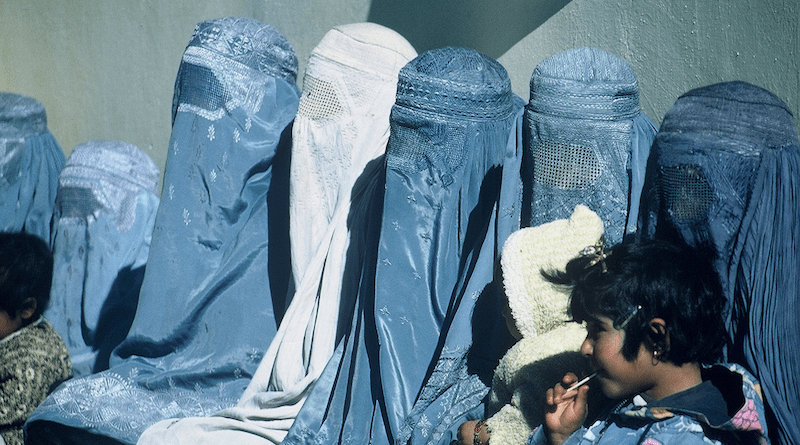NOT THE FIRST
How The Taliban Are Weaponizing Religion Against Women – OpEd
PATRIARCHY IS WEAPONIZATION

A group of women in Afghanistan wearing burqas. Photo Credit: Nitin Madhav (USAID), Wikimedia Commons
Afghanistan, once again under Taliban control, has become a prison for its women. In the three years since the Taliban’s return to power, they have unleashed a wave of repressive laws that target women specifically. The latest decrees, issued by the Ministry for Propagation of Virtue and Prevention of Vice, are aimed at further erasing women from public life. Banned from raising their voices in public, reciting the Quran in the open, or even looking at men who are not their husbands or relatives, Afghan women are subjected to a regime that seeks to control every aspect of their lives.
The Taliban’s latest measures represent a significant escalation in their assault on women’s rights. These rules are not entirely new—they reflect long-standing practices rooted in the group’s interpretation of Islamic law. However, by formalizing these restrictions, the Taliban have made it clear that any hope for a more moderate government has been extinguished.
In urban centers like Kabul, where women once had relative freedom, the Taliban’s morality police are now omnipresent. Women are watched constantly, punished for minor infractions, and even dispersed from public spaces on Fridays, supposedly to allow men to attend prayers without distraction. Women are no longer seen on television or in public office, and their voices, once part of Afghanistan’s vibrant social fabric, have been silenced.
For women like Meena, who runs secret classes for girls, this crackdown feels like the final nail in the coffin of their dreams. “Three weeks ago, I was still hopeful that the Taliban may change and remove the restrictions on girls’ education,” she said. “But once they published their Vice and Virtue law, I lost all hope.” Many families, once willing to defy the Taliban by sending their daughters to secret schools, have now been forced to pull them out. The fear of being caught, of facing the wrath of the morality police, has become too great.
The Taliban’s actions are driven by a distorted interpretation of Islam, one that is rooted more in centuries-old Pashtun cultural norms than in the teachings of the Quran. Women’s rights activists and scholars argue that the Quran does not prohibit women from being educated or participating in public life. Yet the Taliban continue to use religion as a justification for their oppressive rules, presenting themselves as protectors of Islamic values while denying women their basic human rights.
The international community’s response to this repression has been muted at best. While foreign governments and human rights organizations have condemned the Taliban’s actions, their words have done little to change the situation on the ground. For Afghan women, the silence of the world is a betrayal. “The world has moved on from Afghanistan,” said Meena. “The Taliban will keep using religion as a weapon against women. To them, seeing the hair of a girl is a sin, but starving your country is not.”
The Taliban’s reign of control extends far beyond education and public life. They have imposed strict dress codes on women, who are now required to cover not just their heads but the lower half of their faces as well. Violating these rules can lead to severe punishment, enforced not only by male officers but also by female members of the morality police. These female officers, recruited from conservative rural areas, often show even more zeal in enforcing the Taliban’s rules than their male counterparts. For women like Sajia, a former university student, this crackdown feels like history repeating itself. She remembers the Taliban’s rule in the 1990s, when women were banned from education and public life. Now, she sees the same restrictions being imposed once again. “The entire country has turned into a graveyard for women’s dreams,” she said..
As the Taliban seek international recognition and access to frozen Afghan Central Bank reserves, women’s rights have become a bargaining chip in negotiations with foreign governments. Yet Afghan women remain skeptical that the Taliban will ever truly change. For them, the past three years have shown that the regime’s commitment to gendered oppression is unwavering. The international community must not turn a blind eye to the suffering of Afghan women. This is not just a local issue—it is a global human rights crisis. Afghan women need more than words of condemnation from world leaders; they need concrete action. If the world remains silent, the Taliban’s war on women will continue unabated, and half of Afghanistan’s population will be rendered invisible.
Ali Khan Bangash
Ali Khan Bangash is a student of MPhil in International Relations at Quaid Azam University Islamabad.
No comments:
Post a Comment